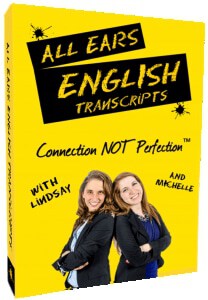
Do you have a lot of tense conversations in English?
Even if you try to keep your conversations drama free, sometimes things can come up from time to time.
Today we are going to talk about a really interesting phrase you can use in this kind of a conversation.
Unfortunately, it’s a bit of an intense phrase but even with difficult conversations, you can connect and learn ways to use English to express yourself.
This phrase we’re going to look at and learn about is “Don’t [NAME] me”, and we’re going to look at how and when to use it.
Get Your Transcripts Today!

Make sure you understand every word you hear on All Ears English.
Bring your English to the advanced level with new vocabulary and natural expressions.
Subscribe and get the transcripts delivered by email.Learn to speak naturally with the American accent.
We have a listener question that may be something that you have wondered about too.
Hello Lindsay, Michelle and Jessica,
I would not love the English language without you all. I Iove you guys!
I’m into the Netflix drama “Suite” lately and I found an interesting phrase in it, which is “Don’t Rachel me”. This is a phrase a woman named Rachel said to her coworker so she would stop begging her for help. She looked annoyed and irritated when saying this.
“Don’t (my name) me.” This is a phrase that I don’t really understand, so I could use your help. When and how do you use this phrase? I found it very interesting because you use your name as a verb in this expression, and that never happens in Japanese.
Thank you always for your great great podcast. I could not live without you!
Rie from Japan
Looking At This English Phrase
So you might have heard such a phrase used in conversation.
If you hear somebody say “Don’t [NAME] me” in conversation, what does that mean?
In this phrase, the person’s name is being used as a verb.
This conversation may very well get a bit intense, as it sounds like it was in the example given on the show.
This is definitely a phrase that has some negative connotations with it.
It may not be received very well, and therefore you want to be sure that you are using it with the right person and in the right atmosphere.
If you are saying this in the wrong way or to the wrong person, you might end up offending them.
So let’s take a look at how you might use this and when it may work in the best possible way.
How Is This Used in Native English?
Since it’s a bit unusual to use somebody’s name as the verb, you may wonder what the right way to use this is.
This isn’t the type of phrase that you are going to use in conversation everyday in English.
This is a good phrase to use in English, but only if the right situation applies.
There are a couple of different ways that you might use this phrase in an appropriate way.
- If you are arguing with someone: Let’s say you are arguing with someone, and they say your name. This is being said to get attention immediately and directly. You may even stop them directly after they say your name. The conversation may go something like this: “Well you should have been at my party. Don’t Lindsay me! You should have been there!” You are angry or you are trying to make a point to the person you are talking to. It shows that you are angry, so they shouldn’t try to reason with you.
- You are trying to get your point across: If you feel very passionately about something and you just want to get your point across, then you might use this phrase. This is typically only saved for something that you feel strongly about, but it definitely lets the other person know that you mean business. You might have a conversation that goes something like this, “I think that the food in Times Square is terrible. You’re being ridiculous, that’s not true! Don’t Michelle me, you’re getting too upset and being rude!”
You may feel justified in both instances, but this is definitely something that you reserve for a time where it’s truly fitting.
Why Do You Think You Might Say This?
There are times when saying “Don’t [NAME] me” may fit and have a reason.
It’s always important to think through the circumstance and if it’s really and truly appropriate, or if it’s worth it.
So when might you say this when it’s actually justified and appropriate?
It may be a way to startle someone, particularly if they are being rude or you are trying to get them to stop talking and listen to you.
It’s as if to say that they shouldn’t try to relate to you by saying my name, or don’t yell at me by using my name.
It’s almost like the name is being considered too personal in this situation.
It’s as if you are saying “No, we’re not friends” or “Don’t use my name to look down at me or yell at me.”
There are times when you might feel that this phrase is the only way to get the person’s attention–but try to use it sparingly.
Should You Use This Phrase?
So the question really becomes–should you use this phrase?
That’s a question that really comes down to your personality.
It would be startling to hear this, but if someone is doing something irritating or if they are treating you in a way you don’t like, you sometimes do need to stand up for yourself.
The key is knowing when to do this, and who it is appropriate to use this with.
You know that this phrase sounds startling and mean spirited–so do you want to sound this way?
That’s what you have to think about when you go think about using this phrase in conversation.
It can be used in a playful and fun way, but you have to have the right relationship to use this.
You might say something like “Why are you calling me so early? Don’t Michelle me, it’s 4am!”
You don’t mean any ill intent here, and it’s a fun way to play on something that they are doing which may be a bit out of the norm.
If you are going to use it in a fun and playful way, just be sure that it comes across that way in conversation.
Also be sure using it in a playful tone with somebody that you feel comfortable with.
Takeaway
The phrase “don’t ____ me” is a bit much, and it can have negative connotations.
Be careful if you use this phrase, but it can also be humorous if used correctly.
It’s all about who you are using this phrase with, as well as the way in which you are saying it.
A name holds a lot of power and is very intimate, so think about how you are using it.
If you use it the right way, it can add a bit of humor and fun.
If you use it in the wrong way, then you run the risk of offending the person you are talking to.
If you have any questions, please leave them below in the comments section.
We’ll get back to you as soon as we can.








